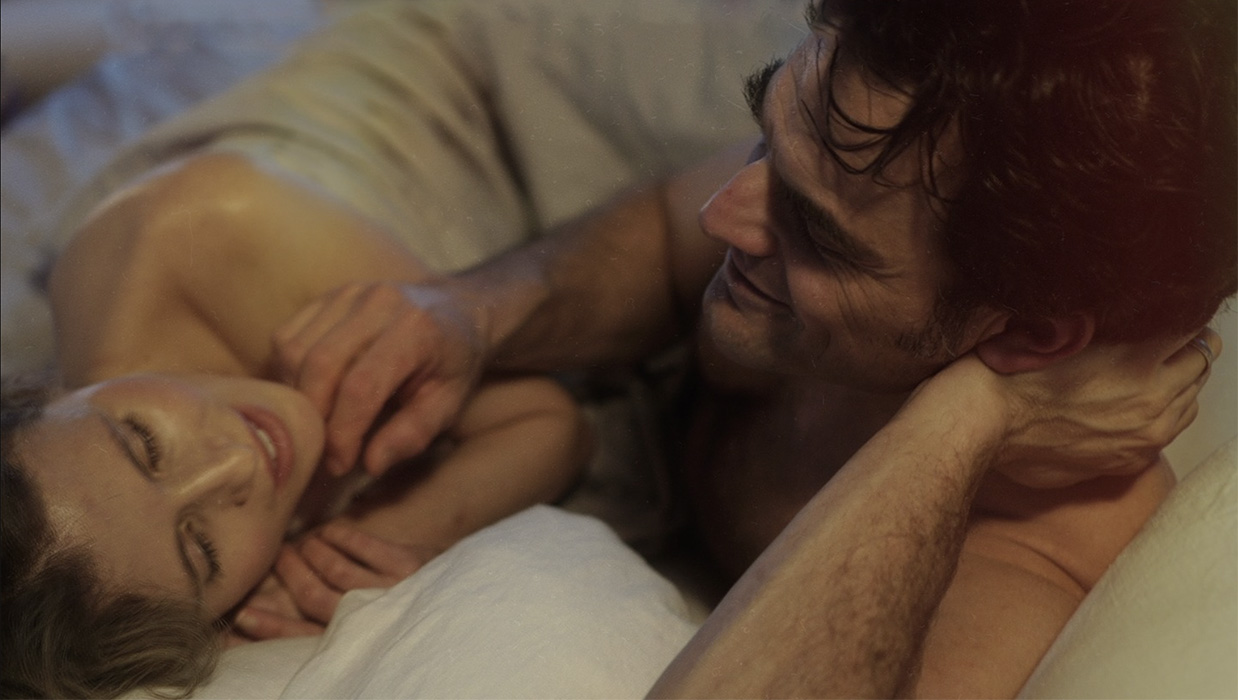The instructions had been simple but mysterious: the audience will meet at a certain spot in downtown Knoxville, then walk to a secret performance location nearby. There was a suggestion of rain in the night air as I arrived at the meetup, and I fidgeted nervously with my umbrella in anticipation. But, I spotted some familiar faces from Knoxville’s theatre scene so I was confident I was in the right place at the right time. I halfway regretted that there were no code words needed or secret handshakes—that might have been fun.
Just prior to 7:30 PM, the assembled group—about 20 of us—was led to a nearby building and up a pitch-dark stairway illuminated only by a couple of flashlights. In the darkness with little outside light other than what kissed two thinly curtained windows, one could barely make out two sets of folding chairs on risers surrounding in close quarters what looked like an impromptu bedroom set. In the bed, a couple was having noisy sex, or at least, doing so theatrically.
Thus began what is no doubt this season’s most interesting audience experience along with a superbly compelling and impressive performance of Terrence McNally’s Frankie and Johnny in the Claire de Lune. The two-character play was being given 5 performances by Amber Collins Crane and Gregory Crane as the title couple (and in fact, a real life married couple) with direction by David Ratliff.
Once everyone was seated and the body-bumping hit a climax and afterglow, a lamp was turned on and we find we are in Frankie’s shabby apartment. It’s a walk-up studio on Manhattan’s Tenth Avenue in the 50s and the couple has just had their first “movie-then sex” date. The pair works at a nearby greasy spoon where she is a waitress and he is the newly-hired short-order cook. Had there been more intense color in the dim light arrangement, one might have felt themselves participating in an Edward Hopper painting.

As small talk between the two evolves, or devolves, into nit-picking and a midnight snack of cold meat loaf and milk, there is the expected period of “what’s next” and the inevitable questioning of motives. As it turns out, each character has had different expectations for the evening and their own histories—gradually revealed—yield different levels of willingness, or unwillingness, to seek out human connections.
McNally’s emphasis ebbs and flows—first revealing Frankie and her relinquished dreams and abusive boyfriend; then Johnny, who is comfortable sharing everything, feels he should be a success, but isn’t. If only he had someone like Frankie, he muses, he would be complete. As he praises her “attributes,” she withdraws from what she sees as insincerity and then recoils as his unrelenting pressure to be loved becomes obnoxious.
A classical music radio station has been playing in the background and Johnny decides to take his romantic pitch to a higher level; he calls the station, talks to the announcer, and requests a piece: “the most beautiful song in the world.” As it turns out, the announcer (a romantically pompous voice over by Richard Squeri) chooses Debussy’s “Claire de Lune,” a choice that speaks volumes on the differing perception of what love is or could be.
The play, first produced in 1987 by the Manhattan Theatre Club with Kathy Bates and Kenneth Welsh, now shows its fragile age a bit, much like the two characters. Director Ratliff and the Cranes have quietly submerged some of the references that have diminished meaning for a current audience, but have beautifully captured the reality of the desperation and universal conflict of two different individuals at a threshold point in their lives. Admittedly, too, the Cranes are a very physically attractive couple, a trait that is a bit in conflict with the playwright’s original intention that Frankie be “frumpy” and Johnny be “creepy”—neither attribute applies here. On a technical level, both actors have importantly given their characters credible and effective accents that reflect the blended dialects of the northeast, carefully avoiding area stereotypes. As a result, when we hear their claims of originally being from Allentown, PA, we aren’t really surprised.
While theatre performed in close quarters has its own list of pros and cons, its potential effectiveness in transforming the audience into voyeurs is inarguable. In the case of this production of Frankie and Johnny in the Claire de Lune, one cannot escape the personal reflection as we imagine ourselves in their shoes. That is what theatre does best when it becomes an experience for the audience and not just a presentation.







What a good and thoughtful review!
What fun to be one of this audience.